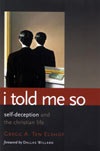Skill Builders
Article
A Preacher's Perspective on the Book 'I Told Me So'

Gregg Ten Elshof's slim volume, I Told Me So, is a book about self-deception. The heart of its message is twofold—negatively, that self-deception is usually a form of sin, and positively, that the human capacity for self-deception is a gift of God. While most reviewers, to my knowledge, see the content of the book as solidly biblical, I believe it's misleading in Chapter Six.
Certainly the book is worth reading. After all, none of us can say with any measure of credibility that we ourselves are never self-deceived. Indeed, the magnet-like pull of the book's intriguing title has everything to do with the universal fact that only a self can self-deceive. What intrigues me most about Ten Elshof's book is the idea that self-deception cannot happen unless the one who is self-deceiving lies "without catching [oneself] in the act."
In chapter 1, Ten Elshof says, "If you caught yourself in the lie, you'd miss out on the satisfaction that comes from believing, really believing, [the lie you're hanging onto in that moment]." He says, "Life offers me a deal. … The beliefs I have about myself and others do not need to be true to bring me satisfaction. I only need to believe them." He thus candidly concludes, "So it shouldn't be a shock to us that many have taken the deal. … And what's alarming is that, had I taken the deal [of managing to actually believe things in the face of evidence to the contrary] it would seem to me … that I had not."
In chapter 2, Ten Elshof explains "that we are self-deceived whenever we manage our own beliefs for the sake of some goal other than the truth." Unpacking that further, he says, "So the possibility of self-deception rears its head whenever there is a kind of felt pressure associated with believing something."
In chapters 3 and 4, he says that people deceive themselves in at least five ways:
1. Attention management. We selectively pay attention only to the claims that accord with our perception of the truth—and ignore all the data that threaten to undo it.
2. Procrastination. We say (my words not Ten Elshof's), "It's okay for me not to do that now because I will do that soon," when in reality we have not resolved to get that done.
3. Perspective switching. We borrow the perspective of others, as King David apparently did when for more than a year he looked at himself quite guiltlessly from the vantage point of those who had no idea of his complicity in the murder of Uriah.
4. Rationalization. We justify ourselves with irrelevant reasons that don't truly apply to the situation.
5. Re-sentiment. We re-order our sentiments by denying that we care about something dear to us or by somehow cloaking our vulnerability.
In chapter 5, Ten Elshof explores the social aspect of self-deception. He makes the important point that "the people with whom we surround ourselves are often complicit in our self-deceptive strategies."
In chapter 6, he claims that self-deception can be good. Though Ten Elshof's gentle spirit here is exemplary, his theology in this section is not. He fails to distinguish between human frailty and self-deception. Thus, for example, he says it's okay for terminal cancer patients who are not going to get well to believe that they are. In essence he suggests that when the truth is overwhelming, it's fine for people to deceive themselves.
That is not a biblical principle. Never does he say that trusting in the Lord is far, far better than trusting in false hope. Nor does he explain that self-deception is a sickness of the heart (Jeremiah 17:9) that magnifies our need for God's grace. Misguidedly he further claims that the capacity for self-deception is what enables us to empathize with a person whose perspective is distorted. He says, "If I were incapable of adopting any perspective but the true one, I would be incapable of seeing … from your (distorted) point of view." Discernment of the truth is what enables us to see. Jesus was never self-deceived, yet he empathized with his killers saying, "Father, forgive them for they know not what they do" (Luke 23:34).
The implications here for preachers are innumerable. To start with, we do well to bear in mind (and not self-deceive so as to make ourselves feel better) that one reason why so many people in the church don't change, even after hearing a good sermon, is precisely because they didn't hear the message after all. Many in the congregation may affirmatively nod yes to the preacher's words while yet telling themselves subconsciously things that are not true—such as:
(a) simply hearing a sermon on an issue suffices to make that issue a non-issue in their lives
(b) they will surely apply the message, though unfortunately not today
(c) the message wasn't challenging—precisely because they have no intention whatsoever of embodying that message in their lives
(d) the message was dull, because the part they heard is the part they already knew.
Maybe the best section of Ten Elshof's book is chapters 7 and 8, where he offers sound advice on how to battle self-deception in our own personal lives—by repenting from it.
Sarah Sumner, PhD, serves as the Dean of the A. W. Tozer Theological Seminary and as the founder of Sumner Consulting.







